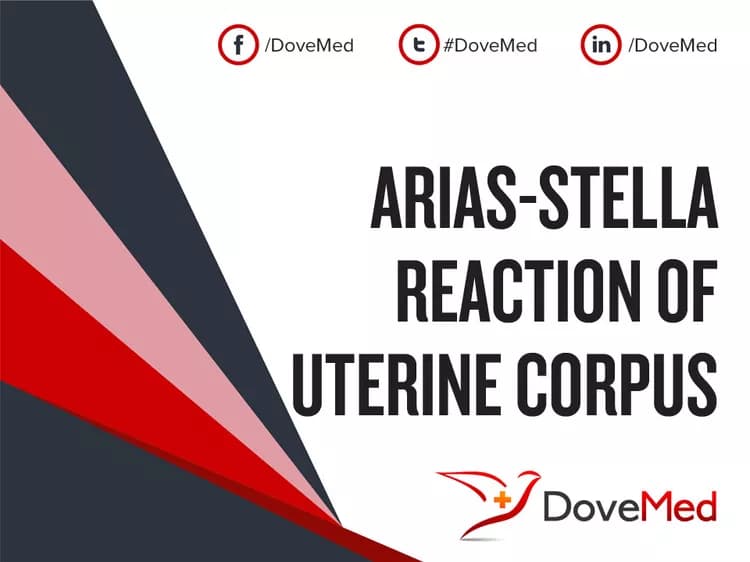
Arias-Stella Reaction of Uterine Corpus in Normal Pregnancy
What are the other Names for this Condition? (Also known as/Synonyms)
- Arias-Stella Effect of Uterus during Pregnancy
- Arias-Stella Phenomenon of Uterine Corpus in Normal Pregnancy
- Normal Pregnancy and Uterine Arias-Stella Reaction
What is Arias-Stella Reaction of Uterine Corpus in Normal Pregnancy? (Definition/Background Information)
- Arias-Stella Reaction of Uterine Corpus in Normal Pregnancy is a benign tumor-like condition caused due to a change in the endometrium of the uterus. The condition is a normal physiological process of the body, caused due to hormonal response. It is mostly observed in pregnant women
- It is an incidental finding during a microscopic examination by the pathologist. Arias-Stella Reaction of uterus is similar to Arias-Stella Reaction of the cervix
- There are no clearly established risk factors for Uterine Arias-Stella Reaction in Normal Pregnancy and the cause of tumor formation is unknown. However, it may be influenced by hormonal changes
- No significant signs and symptoms or complications are typically noted. However, it is important to undertake a differential diagnosis to rule out any carcinomas or precancers
- There is no treatment necessary for the condition, since it is asymptomatic and benign. In general, the prognosis of Arias-Stella Reaction of Uterine Corpus in Normal Pregnancy is excellent
Who gets Arias-Stella Reaction of Uterine Corpus in Normal Pregnancy? (Age and Sex Distribution)
- Arias-Stella Reaction of Uterine Corpus in Normal Pregnancy is observed in pregnant women
- There is no known ethnic or racial preference
What are the Risk Factors for Arias-Stella Reaction of Uterine Corpus in Normal Pregnancy? (Predisposing Factors)
- No definitive risk factors have been identified for Arias-Stella Reaction of Uterine Corpus in Normal Pregnancy
- In general, Arias-Stella reaction may be also observed in women undergoing hormone therapy (non-pregnancy associated factor), or having gestational trophoblastic disease (a group of rare, pregnancy-related tumors), or in women with ectopic pregnancy
It is important to note that having a risk factor does not mean that one will get the condition. A risk factor increases ones chances of getting a condition compared to an individual without the risk factors. Some risk factors are more important than others.
Also, not having a risk factor does not mean that an individual will not get the condition. It is always important to discuss the effect of risk factors with your healthcare provider.
What are the Causes of Arias-Stella Reaction of Uterine Corpus in Normal Pregnancy? (Etiology)
- Currently, the exact cause and mechanism of formation of Arias-Stella Reaction of Uterine Corpus in Normal Pregnancy is unknown
- However, the condition may be due to hormonal changes in women, since it is mostly seen during pregnancy
What are the Signs and Symptoms of Arias-Stella Reaction of Uterine Corpus in Normal Pregnancy?
- In a majority of cases, Arias-Stella Reaction of Uterine Corpus in Normal Pregnancy is asymptomatic, presenting no significant signs and symptoms
- The condition may develop within the endometrial glands
- Arias-Stella reaction or Arias-Stella phenomenon may also be observed in the uterine cervix
How is Arias-Stella Reaction of Uterine Corpus in Normal Pregnancy Diagnosed?
A diagnosis of Arias-Stella Reaction of Uterine Corpus in Normal Pregnancy may involve the following steps:
- Evaluation of the individual’s medical history
- A thorough physical (pelvic) examination
- The Arias-Stella reaction is an incidental finding on a endometrial biopsy or curetting performed post-pregnancy for a variety of reasons (such as retained placental tissue)
Note: The cells of Arias-Stella reaction may appear atypical when examined under a microscope. Hence, a careful microscopic examination should be performed, to rule out the possibility of clear cell adenocarcinoma of cervix and endocervical adenocarcinoma in situ.
Many clinical conditions may have similar signs and symptoms. Your healthcare provider may perform additional tests to rule out other clinical conditions to arrive at a definitive diagnosis.
What are the possible Complications of Arias-Stella Reaction of Uterine Corpus in Normal Pregnancy?
- No significant complications of Arias-Stella Reaction of Uterine Corpus in Normal Pregnancy are noted, because in the context of normal pregnancy, Arias-Stella reaction is a benign and harmless condition
- Also, study reports indicate that no malignant transformations have been observed in the context of normal pregnancy
How is Arias-Stella Reaction of Uterine Corpus in Normal Pregnancy Treated?
- Generally, no treatment measures are necessary for Arias-Stella Reaction of Uterine Corpus in Normal Pregnancy
- Follow-up care with regular screening and check-ups are important
How can Arias-Stella Reaction of Uterine Corpus in Normal Pregnancy be Prevented?
- Arias-Stella Reaction of Uterine Corpus during Pregnancy is a normal physiological process and no prevention is necessary
- During pregnancy, regular prenatal checkups are necessary to monitor the health of the expectant mother and baby in the womb
What is the Prognosis of Arias-Stella Reaction of Uterine Corpus in Normal Pregnancy? (Outcomes/Resolutions)
- The prognosis of Arias-Stella Reaction of Uterine Corpus in Normal Pregnancy is excellent, since it is a benign condition
- No unfavorable outcomes or complications are noted during pregnancy, due to the presence of Arias-Stella reaction involving the uterus
Additional and Relevant Useful Information for Arias-Stella Reaction of Uterine Corpus in Normal Pregnancy:
- Gestational trophoblastic tumors generally affect women who are in their childbearing age. It occurs very rarely in postmenopausal women
The following link is a useful resource for gestational trophoblastic tumors:
http://www.dovemed.com/diseases-conditions/gestational-trophoblastic-tumors/
Related Articles
Test Your Knowledge
Asked by users
Related Centers
Related Specialties
Related Physicians
Related Procedures
Related Resources
Join DoveHubs
and connect with fellow professionals

0 Comments
Please log in to post a comment.